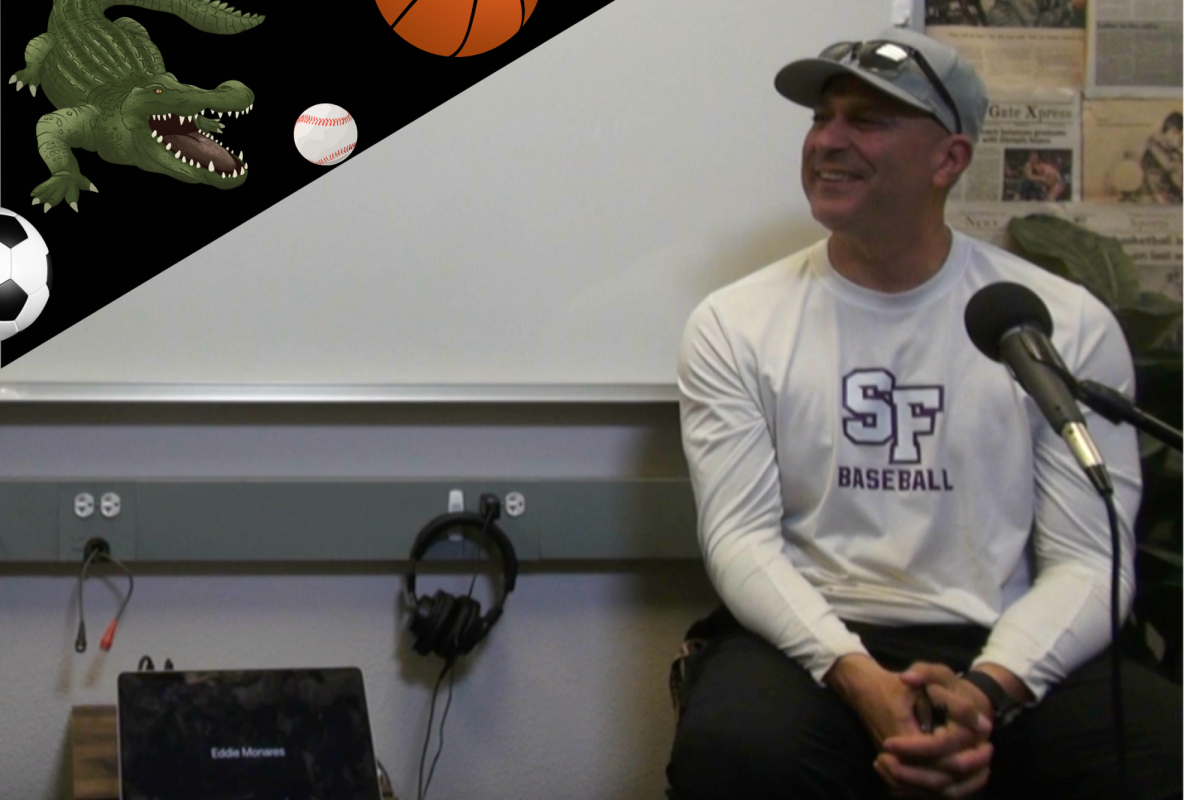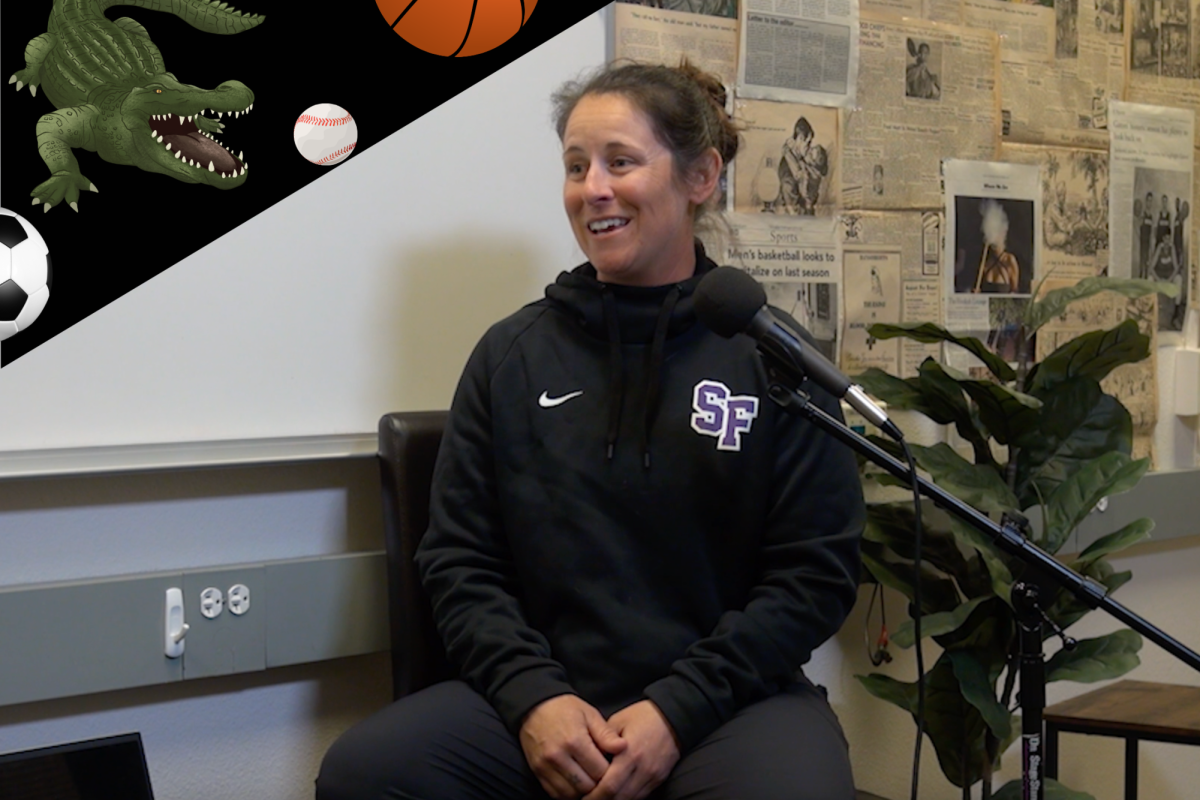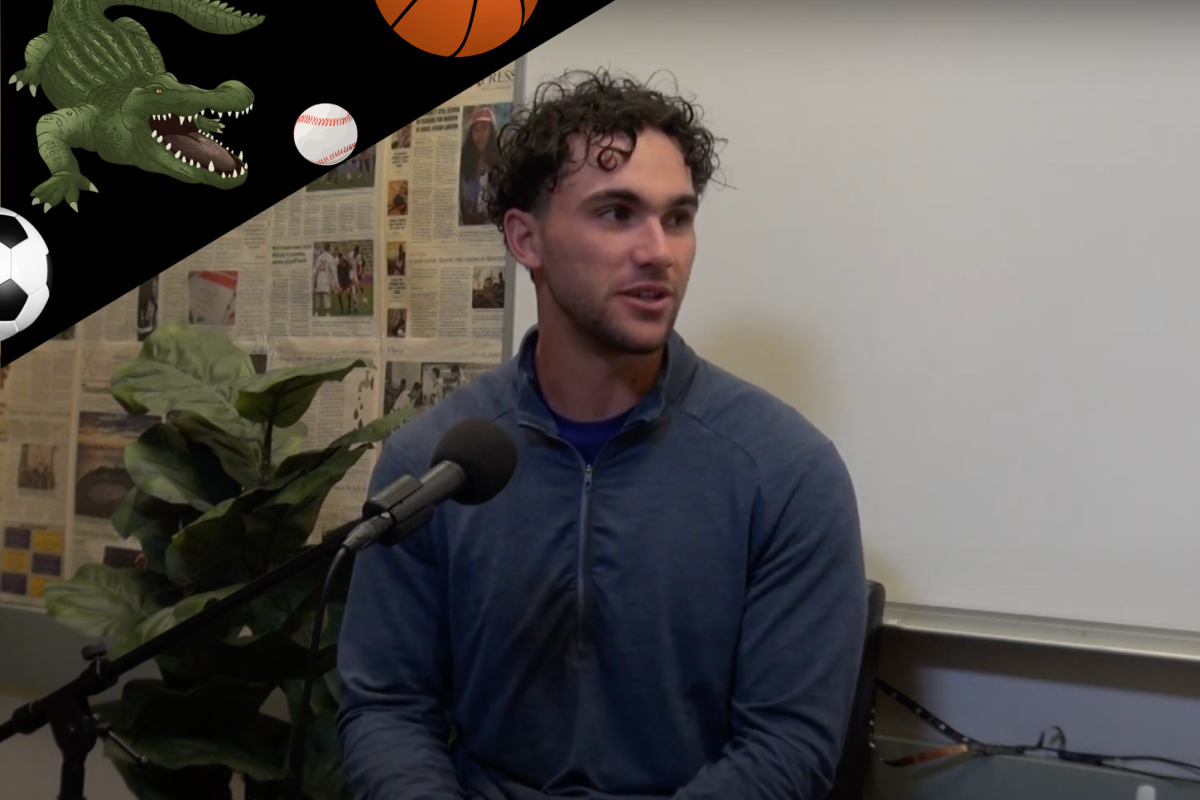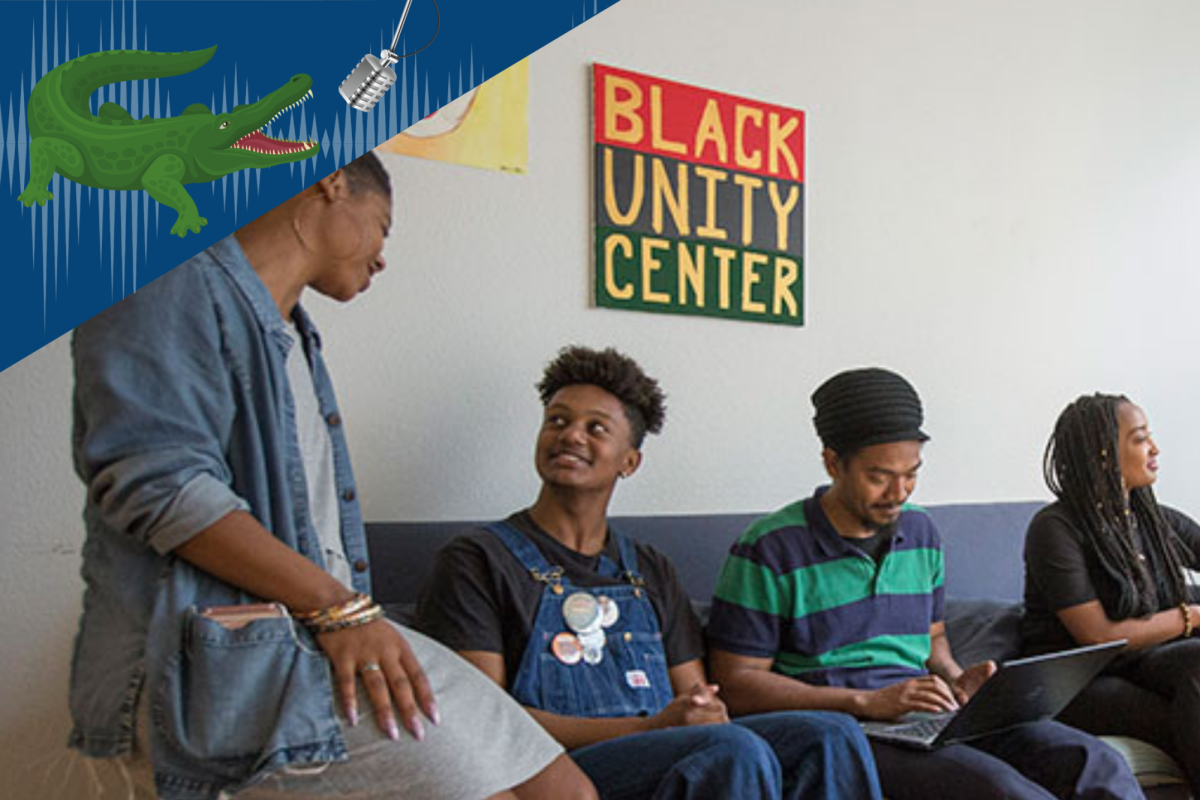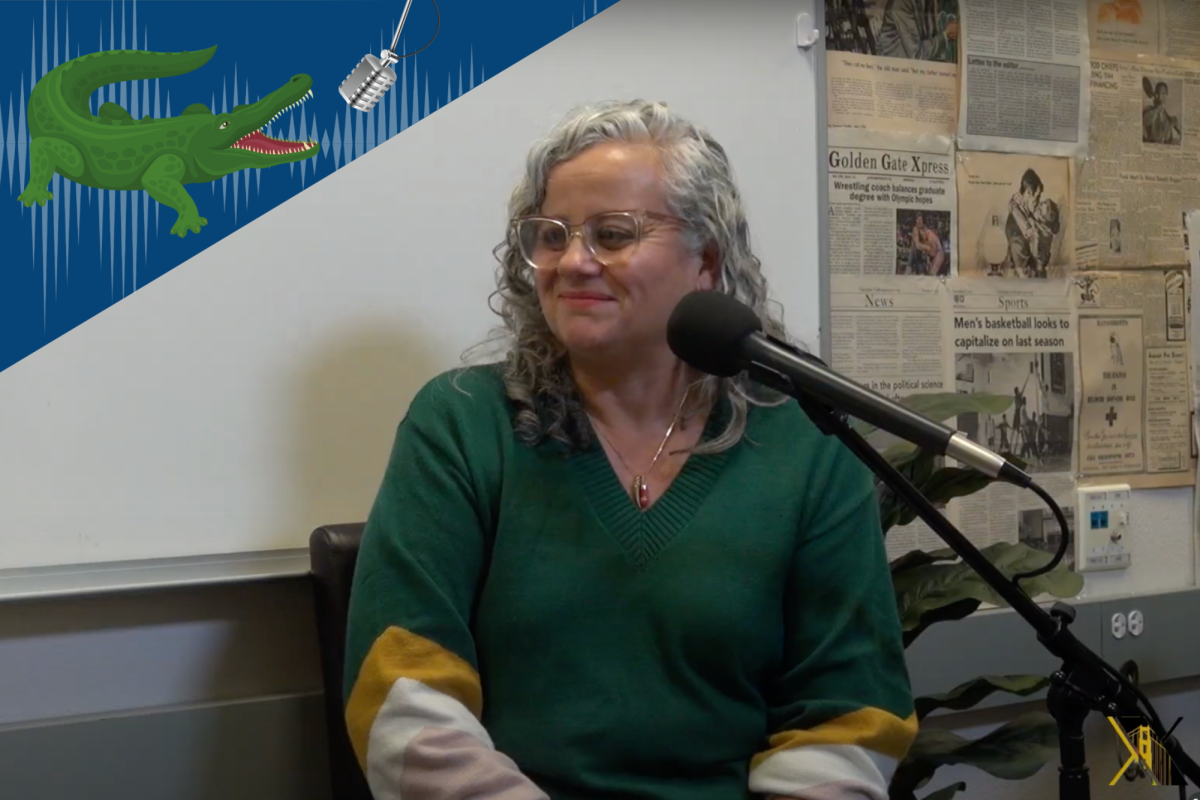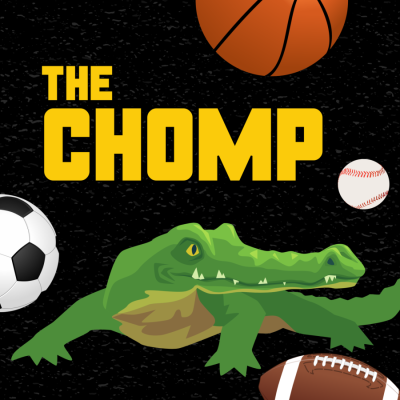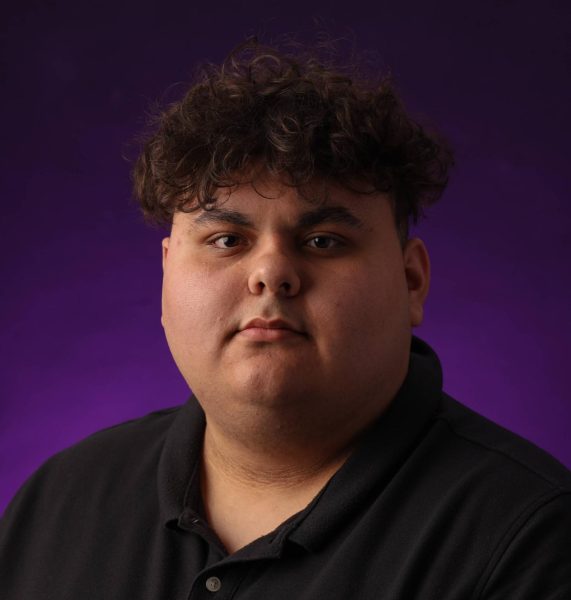Introduction:
Monares 00:00-00:17
Hello Gators. Welcome back to the Chomp Podcast. My name is Eddie Monares, and I am the campus editor for Golden Gate Xpress. On this week’s episode, I will be joined by head baseball coach Tony Schifano. We are going to discuss the start of the baseball season, his journey as a player and as a coach and some MLB topics, let’s get into it.
Interview:
Monares 00:20-00:21
Coach, thank you for joining the show.
Schifano 00:21-00:22
My pleasure, thanks for having me.
Monares 00:23-00:27
First question, you know, you guys are only a couple games into the season. How would you assess the start?
Schifano 00:27-00:56
Rough start. Yeah, we scheduled a very strong opponent, two strong opponents, Billings and Westmont. Westmont was nationally ranked last year, regionally-ranked, and all their players came back. But, you know, you have to play those games on the road for RPI and test the guys early in the season. And you know, obviously the record, we got the win against Montana Billings came back and beat them on Monday on a walk off at East Bay.
Schifano 00:57-01:27
And then this weekend, we went down to Westmont, and we came out like gangbusters and scored a couple runs early. And it’s a very offensive ballpark. They’re a very offensive team. And we just, we just got out-scored in each game. You know, the last game, I was very proud of the guys. They were down three, nothing. We’re down three-zero, in the series, down three, nothing late in the game, and we fought back and got it to extra innings, and unfortunately, just didn’t get it done. But we’ll learn from it, grow from it, and be better for it.
Monares 01:28-01:38
I’m always curious. As a baseball coach, you know, in basketball, you could change your offense from season to season, change your defense. In soccer, change tactics and formation. As a baseball coach, how do you change season-to-season?
Schifano 01:39-02:03
Well, I think your personnel changes with regards to graduation. Now the transfer portal plays into it. So, you know, we lost one of our best players last year, true freshmen. We lost them in the portal to Cal, Berkeley but then we gained some players in the portal, guys that you’ll hear about throughout the season. Aaron Roberts, he’s from Cal, a young man named Alec Trukki — he’s going to pitch on weekends for us.
Schifano 02:03-02:27
So your personnel changes, you know, and you kind of evaluate them in the fall and get an idea, okay, are we going to be a speed team? Are we going to be a team that relies on the short game? Are we going to hit the ball at the ballpark? Are we going to pitch? What are our strengths? And, you know, I think we’re still feeling that out a little bit. That’s what the preseason is for, but we better figure it out pretty soon, because Chico’s coming in in a couple of weeks.
Monares 02:28-02:34
Last season was one of your strongest seasons, 34 wins, the most in the CCAA era. How do you plan to build upon that?
Schifano 02:35-02:52
Yeah, our ultimate goal is to win a national championship. And that’s the goal, and I think the wins will take care of itself along the way to that goal. And we’re pretty motivated by what women’s volleyball did this year, making it to the national championship game.
Schifano 02:53-03:12
This is an opportunity for us. We’re senior-heavy. I think we have 20-plus seniors on the team. They have regional experience getting to the regional championship game. They’re hungry, and you just build on it by having the same goal, I think, and that goal is to win it all, and everything else will take care of itself along the way.
Monares 3:13-3:17
You mentioned women’s volleyball. [Do] you often look to other sports for inspiration? Are you looking at their journeys?
Schifano 03:18-04:01
Absolutely. You know, Matt Hoffman, head coach, came in, I think, six years ago, maybe, and, and he’ll tell you, I think they won a couple games that year. We talked back then about the journey. And I was a young coach as well, and we had made a couple playoff appearances at that point. But like him, early in my career, it was a struggle to build the program the first few years. We talk about that journey, that ride of enjoying the ride because there’s gonna be ups and downs along the way. I do look to other coaches. I steal stuff from other coaches, motivational things they do, team building concepts they do things of that nature.
Schifano 04:02-04:23
But, you know, I think it’s important that we all push each other in the athletic department and to succeed because we do have that little chip on our shoulder here. Maybe we don’t all have the best resources or the best facilities and things of that nature. But we have fantastic student-athletes who are highly motivated. And absolutely, I look to other programs for motivation.
Monares 04:24-04:33
Last season, you lost in the regional finals to Cal State Monterey Bay, correct? Is that something you use as motivation going into season? Or is it something you kind of just flush and, you know, try not to think about?
Schifano 04:33-04:55
At times you can use it, but we do also have 20 new players this year who never competed against Monterey Bay. So I don’t think that it’s a tool to keep the whole team motivated. I think the motivation is, everybody has that dream when they’re a young kid to play in the College World Series. So for us, that’s the motivation.
Schifano 04:46-05:06
So for us, I don’t really use it, I don’t really talk about certain teams or anything. I just say, “Hey, if you want to be the best, we’re gonna have to beat the best. And you know who the best is right now.”
Monares 5:07-5:13
I want to transition to you as a player. You know, what’s your origin story with baseball? How did you find baseball as a kid?
Schifano 5:13-05:35
I took to it really young. I believe, 6 years old, I was in T-ball, and I have vivid memories of T-ball, to be honest with you. It came so easy for me to catch the baseball and throw it and hit it. I was in my backyard every day after school, hitting the nets and doing all that, throwing the ball against the wall, playing catch with my dad and that was primarily my sport.
Schifano 05:36-06-22
I played a little bit of soccer, but I was small growing up, very tiny, and had no scholarships, no offers out of high school. Barely played my senior in high school, rode the bench a lot but I knew I had a skill set. I knew I was going to grow eventually. And so I walked on to UC Davis, no scholarships, it was an even playing field. And it took me two years of adding strength and refining my skills, and I finally found my way on the field and never missed an inning for the last three years of my career. And I was really, really fortunate to be offered a free agent contract from the Florida Marlins at the time. I signed, not knowing what was ahead of me, and it ended up being 10 years of professional baseball with five different organizations. And so that was kind of my journey.
Monares 06:24-06:28
How does someone with no offers, a walk on the UC Davis, make it to the Baseball Hall of Fame there?
Schifano 06:29-07:08
A lot of hard work, some luck, good coaches. You know, I had really good players ahead of me that I watched a lot, and kind of tore my game around. But, I just think I tell the guys all the time to just work hard, the game will take care of you if you take care of the game. And I was just a hard worker. I took 1000 ground balls. I look back now and wish I had really hit the weight room more, because that would have been a difference maker in the sense of when I got to professional baseball. But back then, weights wasn’t as big as they are now, strength training and whatnot.
Schifano 07:08-07:45
But yeah, that’s a tough question to answer, no one’s ever asked me that. But a lot of hard work and I think of love of the game. I love baseball. I love being on the field. I love the smell of the grass. I love a ball bouncing on an infield dirt and reading hops and just those little things. When I go to a baseball game, I go to a Giants game. I think sometimes the people I go with go, “Hey, are you even watching what happened?” I’ll be like, I’ll watch the shortstop for six innings, and just watch his movements and everything. And so I guess everybody has their passion and their love, that’s mine.
Monares 07:46-07:47
Were you a shortstop?
Schifano 07:47
I was.
Monares 07:49-07:56
You mentioned signing with the Florida Marlins. I believe, I also read you were with the Astros. What’s it like going through the minor league farm system with these different teams?
Schifano 07:57-08:47
Every team was unique. The one that really stood out to me, I love the Marlins. That was my original team, and I learned a lot in that Marlins system. I got traded to the Blue Jays in the middle of the season. I was a player to be named later in a trade. I was in double-A with the Marlins in Portland, Maine, and got traded like 10 minutes before a game started. The next day, I’m in Knoxville, Tennessee, playing double-A for the Blue Jays. And, you know, I tell this story a little bit, I’ll be short with the story. But the head coach of the Blue Jays double-A team didn’t really know me because I was traded over and he thought that the position on the trade, on the fax, was an eight. And so my opening day with the Blue Jays was in center field, and I had never played center field in my life.
Schifano 08:48-09:44
It was actually a six, the ink got smeared, but it actually extended my career another five, six years, because now if you could play center field, you could play all the positions, and if you can play short, you can play all the infield positions. So I became this super utility guy, and it really extended my career. So it was kind of a blessing, in a way. But yeah, the journey is tough, long bus rides. I remember 18-hour bus rides, you know, 20-game, 20-day road trips. Terrible pay in the minor leagues, sometimes horrible accommodations. There were a lot of showers that were cold and dirty in some of those places, = just old ballparks, but something I would never trade those 10 years for. Amazing friendships, amazing experiences, saw the country, got to play internationally as well as a result. Made a lot of lifelong connections and learned a lot.
Monares 9:45-9:50
It’s crazy you mentioned you were a player to be named later. Sometimes we never even hear about those guys when these trades go down. Who those players are.
Schifano 09:50-10:24
That young minor leaguer. And turns out you mentioned the Astros. Not the Astros, but my last year was Detroit, and I spent spring training, and then just two months in single-A with them, but my roommate was Justin Verlander. So he was just this young, top prospect, and he, I mean, every outing in single-A looked like he was going to throw a no hitter. He was unbelievable. And you could just tell he was destined for stardom. But, you know, I got released after a month or two, and then he got moved up to double-A and the rest is history.
Monares 10:25-10:28
Post-playing career, how’d you find coaching? Is that something you always wanted to do?
Schifano 10:29-11:06
It found me. During my minor league career, you basically have to work in the off-season because you don’t get paid. And so I did substitute teaching, and I fell in love with the classroom. And so when my career ended, I eventually became a teacher. I was teaching high school English in San Jose, and I just figured, maybe I’ll, I was kind of helping out at Los Gatos High School a little bit. A buddy of mine was coaching there, and I thought, okay, this will be my life. I’ll be a teacher, coach some high school baseball and maybe start a family and then, out of nowhere, my alma mater, UC Davis, called me.
Schifano 11:07-11:55
An assistant coach had just left for St Mary’s. I had no clue. I thought they were calling for alumni donations, because I just missed the golf tournament. So I called them back, and it turns out they were looking for an assistant coach and wanted to know if I was interested. And they had just turned Division I, so they just made that transition in 2008 and what a blessing. I took the opportunity. I jumped on it. That first year, we went to a regional and played at Stanford, beat Stanford on Friday night. Amazing, amazing experiences, right off the bat. I spent 10 years there at UC Davis, and then eventually I moved on to here and spent eight years. No, I apologize, eight years at UC Davis, and this is my 10th year at SF State.
Monares 11:56-11:59
Was there a coach you had in your playing career that inspired you to become a coach?
Schifano 11:59-12:46
Wow, great question. A coach? Yeah, I had a few, you know, in the minor leagues I had a gentleman named Bob Mariano. He was my single-A coach with the Dodgers in Vero Beach. And I was a veteran, and I had been released a few days earlier by the Astros from triple-A, and the Dodgers called and said, “Hey, we got a spot for you, but it’s back down in single-A.” Which is hard to swallow when you’ve played double-A and triple-A for a while, and you’re in your late 20s. But I went down to single-A and Bob Mariano was the head coach, and I found this passion, this love for the game again. And he brought a confidence out of me that I hadn’t had for a few years. And it really helped me propel, finish my career on a positive note.
Monares 12:46-12:52
You mentioned getting the triple-A. I mean, how tough was that you’re one step away from the major leagues?
Schifano 12:52-13:46
Yeah, that was great. I unfortunately wasn’t a starter on that triple-A team, you know, but I felt like I could play at that level. So I was a backup to two infielders, three infielders that eventually were, that were the three infielders for the World Series team. I don’t know if you remember, the Astros had the team with Roger Clemens and Andy Pettitte. The infield was Keith Ginter, Adam Everett and Morgan Ensberg, and they were the starting three in the triple A team, and I was their backup, and just a great experience playing with them. Roy Oswalt was on that team, ended up being an all star with the Astros. So I was very fortunate to play for organizations that really believed in the development of the players they drafted and bringing them to the big leagues. Whereas there are organizations that believe in using them as trade bait a lot. So it was a really good experience, and a lot of good coaches throughout my entire career.
Monares 13:47-13:54
You mentioned coaching at UC Davis. You’re obviously an alum. What was the decision to come to San Francisco State? Was it a tough decision to leave your former college?
Schifano 13:54-14:38
Extremely tough to leave. You know, I had ascended to associate head coach by my ninth or 10th or my seventh or eighth year there. We were having good success. We had rebuilt the program after that regional appearance. We had gone down. We lost seven players to the draft after that year. We had to rebuild the program, and we were in a good spot. I had a home there. You know, the goal was, obviously, to eventually become the head coach there. But you know that the opportunity came up at San Francisco State to be a head coach. And I’d say that was probably the most important aspect of it, was the opportunity to be a head coach and run my own program.
Monares 14:39-14:45
You mentioned you’re 10 years in now, a decade in as a coach. You know, where do you feel like you’ve grown the most in these 10 years?
Schifano 14:46-15:37
Oh, wow. Yeah, so many, so many aspects, whether it’s recruiting or relationships with the players and that day-to-day. You know, when I was, when I was a young coach, 18 years ago I was fiery, I was still a player mentality. It takes some time to mature as a coach and understand, you know, you’re not a player anymore, and that these young men are going to feel the ups and downs that you felt as a player. And you know they’re going to look to you on a daily basis for, you know, how you react to certain situations, and how you become a leader. And I’d say the number one thing I’ve learned is how to be a leader and what’s become most important to me. And of course, we all want to win, but what’s become most important to me is the relationships with the players and how they develop as young men while they’re here and beyond.
Monares 15:38-15:45
You mentioned getting out of that player’s mentality when you get into coaching. I mean, how tough is that? You know, to realize you’re not a player anymore. You can’t affect the game playing-wise. You’re a coach now.
Schifano 15:45-16:36
Yeah, it’s really tough in the beginning. And I actually have that conversation with a lot of young coaches, you know, I’ll coach against these young coaches across the field and, and I’ll see how fiery they are and how they live and die on, you know, a pitch or two or an inning or something and maybe if I get an opportunity to see them on the recruiting trail, you know, just offer some old man wisdom, like, “Hey man, stay with it. Believe in your players, trust them. Show them you love them. You know, it’ll pay off down the road.” And some guys take it, and some guys, you know, I’m sure it goes right through one ear out the other. I did have somebody grab me when I was a young coach and say, “Hey, man, you gotta settle down a little bit and realize this is a — this is a journey for all these young men and really be somebody that’s inspirational to them.”
Monares 16:37-16:38
Do you remember who that was?
Schifano 16:38-16:42
Yeah, it was my former, my two of my former bosses at UC Davis, Rex Peters and Matt Vaughn.
Monares 16:44-16:56
You mentioned recruiting as well. I know San Francisco State’s obviously not a Division I school. I mean, what’s recruiting like? I know, in this age of NIL and, you know, in different sports, it’s crazy how teams are spending money to build players. I mean, how do you do it?
Schifano 16:56-17:35
When I first started in this business, you were thinking like, when you recruit a young man, and you were, you know, you had a class that you brought in, like, 10-12 kids. You were thinking about that next class, okay, I don’t need a catcher. I don’t need a shortstop [because] I just signed them, and you’re building for the next three to four years. Now it’s year to year. I mean, honestly, with the transfer portal, and we have a center fielder this year that’s a very special player. He’s a junior, redshirt junior, so he has another year of eligibility next year, and he could play at that next level very easily.
Schifano 17:36-18:24
And you know, and so now the mindset is okay. Years ago, I would have thought, oh, I have him for the senior year no matter what, right unless he got drafted. But now it’s, we got to go find another center fielder, or move somebody over that’s already here from left field or right field. So it’s definitely changed from that, that building for the future to year to year, the transfer portals change that. The junior colleges are loaded with talent now. So I think that, I think what’s changed the most is a lot of high school kids are getting left behind, and programs are recruiting junior colleges and the transfer portal more to get older players to become better quicker, and then recycle that lineup next year.
Monares 18:25-18:37
In these uncertain times. I don’t know if you were slated to play Sonoma State this year, but they obviously cut their athletics starting next year. I mean, what has the university told you? Have you heard any or gotten any assurances that that won’t happen here? What has been their messaging to you?
Schifano 18:38-19:12
Yeah, it’s very unfortunate what happened there. They are in our conference. So we do play them. We’ll be playing them. I think it’s about the middle of the season somewhere. You know, we haven’t had any assurances or anything. You know I think President Mahoney is looking at every aspect on campus. And I think everybody realizes there has to be cuts, tighten the belts in certain areas. I just been telling everybody we’re bracing for the worst and hoping for the best.
Monares 19:12-19:16
Is that the same message you’ve given the team? Has it even been brought up at all?
Schifano 19:16-20:11
It’s been brought up. I addressed it. I held off for a while with the guys. But then I started hearing things that, you know, the athletes are talking, especially after Sonoma State’s announcement. And it’s, there’s, it’s no secret that San Francisco State’s in a budget crisis as well, and we have been since the pandemic. You know, we just, yeah, the guys had some questions. I answered them as best as I could without having all the facts in front of me. I said, “Hey, all you can worry about is what’s in front of you right now.” And, you know, if that announcement comes, you know, good or bad, we’ll react to it and stay positive and move forward in life. We have a mantra that we say every day in the dugout, and as much as we can, it’s hashtag, keep going. That’s the mindset. Just keep going. Keep moving forward. Good things will happen if you work hard and you treat people the right way and, and we do that.
Monares 20:11-20:13
You mentioned the Giants. Are you a Giants fan?
Schifano 20:14-21:10
I enjoy going to Giants games. I grew up in Southern California, so, you know, the Angels were my team growing up. All my memories from Angel Stadium, and then I did play for the Dodgers for two stints. There’s a little bit of Dodger blue from that, you know, just the experiences and the friendships that I made over the years. But I’ve become really close with a few of the San Francisco Giants executives, Bobby Evans and Ron Wotus. They’ve both been speakers at my banquet that we do to kick off our season. Randy Winn just a year ago. So I have a lot of respect for the Giants. I think Buster Posey was an amazing move for them. I think they’re going to get back to their roots of developing players and bringing those young kids up, like Brandon Crawford and [Madison] Bumgarner and those guys. I think they got another line of kids coming up, yeah.
Monares 21:10-21:16
As an Angels fan. I mean, what was it like to see Ohtani go right across to the Dodgers? I know you said you got the Dodger blue in you.
Schifano 21:17-21:45
Yeah, that was tough. I mean, it’s been a tough decade, you know, you have two of the greatest players ever to play the game on paper, and with Trout and him and just haven’t been able to get it done. You know, everybody would love to see Mike Trout in the playoffs, a little bit of postseason. We got to see what Ohtani got to experience, and really happy for him. It’s been a long time since the Angels have been relevant?
Monares 21:46-21:58
You mentioned the future of college baseball with the portal and recruiting and all that. What about the future of the MLB? You know, people talk about what the Dodgers are doing, signing these players with the deferred money and all that. I mean, where do you see the future of the Major Leagues going?
Schifano 21:58-23:10
Yeah, you know, it’s interesting. I think the game evolves, and it comes back at times. I think the commissioner has tried to change some rules to kind of level up the playing field, with regards to, just for example, making the bases wider, and bringing speed back to the game. So maybe, if you’re an organization that can’t afford all the power, you can develop young talent or and build your offense around speed. And, you know, back to the 1980s when the Cardinals were all speed and went to the World Series every year it felt like. Major League Baseball needs to, I think, at some point, step in a little bit with regards to the deferred money situation. And I think it’s a dangerous slope, what the Dodgers are doing. They obviously have the money. But, you know, the thing about baseball is you could have all the talent in the world on any given day, a starting pitcher can beat you. I think there’s some teams out there that are going to compete with the Dodgers. It’s going to be a grind. You get a five-game series, anything can happen.
Monares 23:11-23:16
I just want to end the show with some quick-fire questions for you. First one, favorite player growing up?
Schifano 23:17-23:20
Roberto Alomar.
Monares 23:21-23:22
Favorite current player?
Schifano 23:22-23:33
Oh, great question. Current player. I really like [Corey] Seager. I really like Seager. It was hard to watch him leave the Dodgers.
Monares 23:34-23:41
You mentioned recruiting and this has now become almost like a yea-long process for you. Are you able to watch much MLB at this point?
Schifano 23:42-24:07
Not as much as I used to. it is on when I get home. I’ll throw it on the TV in the background. I won’t sit and, you know, just so busy, I won’t be able to sit and watch three-hour ball games or anything like that. But, I love watching the highlights. You know, in the morning it’s on TV and stuff like that. But, yeah, but I do, I do love going to Giants games and just sitting in the bleachers or anywhere, and just watching the games.
Monares 24:08-24:10
What was your favorite moment of your playing career?
Schifano 24:11-25:08
Oh, wow. Great question. Favorite moment of my playing career. In college, in 1995, we went to the College World Series. And so that dog pile, I still remember like it was yesterday. On our field, we beat the number two team in the nation to go to the World Series. And it was the first time in school history UC Davis ever made the World Series. So that was an amazing moment, running in from shortstop dogpiling. I played for team USA. That was, that was really exciting. But I say the number one moment was I played for Mayaguez Indios in the Puerto Rican National League, winter League, excuse me. My mom’s Puerto Rican, so she was born and raised in Puerto Rico, and went to games as a child, but having my grandma listen, watch the game on TV, and me playing on in Puerto Rico was a pretty, pretty special moment.
Monares 25:11-25:18
You mentioned you were roommates with Justin Verlander, yeah, would you consider him the best player? I mean, I don’t even know if you guys played together? Who was the best player you ever played with?
Schifano 25:19-26:04
Yeah, Justin was probably the best pitcher. Him and [Josh] Beckett were the two best pitchers that I ever faced. I throw Cliff Lee in there as well. He was solid. The best player, I think, for me, the best player I played against was Chase Utley. He was an amazing player. But the best player I played with, teammate-wise, was a young man, Michael Young. We were in the Blue Jays together, and he eventually got traded to Texas and had a wonderful career, I think, got over 2500 hits with the Rangers and took them to two World Series. Yeah, as a Giant fan, I’m sure you remember the Giants beat them. But Michael Young was probably all around, one of the best players I ever played with.
Monares 26:05-26:07
What’s your favorite moment from your coaching career?
Schifano 26:08-27:24
As a head coach, I would say, in our third year, we, on game 50 against Sonoma State, on our field, it was a do or die, win, win or loss. If we won, we went to the CCAA tournament. If we lost, the season was over, and we won, we dog piled, and that was truly a great moment because those first two years were really tough, you know, trying to rebuild the program, but finally getting over that mountain of getting the tournament. I put last year, you know, being selected to go to the regionals. You know, everybody was, all the players were watching the Selection Show online. And I actually, I had a tape delay on mine. And you know, I’m, I’m where my girlfriend and her daughter were watching the screen, and you know, they’re like, the number one seed in the West region in Point Loma, the number two seed. And all of a sudden my phone started beeping, and I looked at it, and it was like. Okay, everybody going, we did it. We did it. It hasn’t even come on the screen yet. So I had a little bit of a tape delay, apparently. And then eventually, you know, the six seed San Francisco State University making their first regional appearance since 1995, and that was a pretty special moment last year.
Monares 27:25-27:29
It’s February now. I think pitchers and catchers report soon. Do you want to make an early World Series prediction?
Schifano 27:30-27:51
Ooh, good call. Gosh, you got to throw the Dodgers in there, right? I thought Cleveland last year was going to get it done, to be honest with you. But let me think about the National League or the American League. You know what. The Yankees lost Soto, didn’t they? Yeah, did they sign anybody big?
Monares 27:52-28:01
Not that I can remember. Yeah, they lost Soto. I think they brought Garrett Cole back. I think they traded for Bellinger. Cody Bellinger.
Schifano 28:02-28:10
I’m going to go with the Orioles. I think it’s their time.
Monares 28:11-28:15
And just the last one. Do you have any message to Gators fans who want to come out to see the team this season?
Schifano 28:16-28:40
Yeah, please come out and watch the guys. It’s a great group. You know, I think this year’s strength, I know it hasn’t shown earlier, is going to be our pitching. We are going to pitch better. We’re getting our feet under us right now. But you know, it’s always exciting when there’s students in the stands and we have great parent support. The sun will be out soon, and it’s a fun Saturday and Sunday afternoon for you.
Monares 28:41-28:43
I appreciate you joining the show coach. I know you’re a busy guy.
Schifano 28:44-28:45
Anytime. Anytime. I’d love to come on.
Monares 28:45-28:46
Thanks for coming on.
Schifano 28:46-28:47
All right, you’re welcome.
Monares 28:48-28:52
I’m Eddie Monares reporting for Golden Gate Xpress. Thank you for listening, and stay tuned for more episodes.




